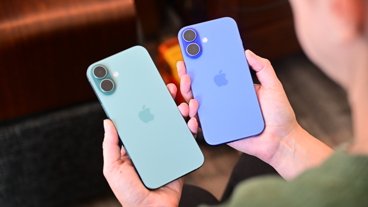According to a report by Bloomberg, the two banks are evaluating the security of new software designed to support corporate messaging on the iPhone.
Bank of America, the largest bank holding company in the United States, and Citigroup, the world's largest financial services network, each employ over a quarter million people.
The trials reportedly involve over a thousand users between both banks, although neither has made their plans public yet. Both banks were among the first to support Apple's iPhone App Store with custom banking apps with the ability to perform secure transactions.
Update: AppleInsider has also heard from a source who reported Citigroup "is also testing iPad for remote workers and business travelers." A second reader reports that Zurich Financial Services is "also testing the iPhone and some proprietary applications to replace BlackBerrys."
BlackBerry's slip, Apple's grab
Once seen as protected by extreme customer loyalty, RIM's BlackBerry platform is now eroding in large part because the company hasn't been able to deliver a competitive user experience or vibrant third party app ecosystem outside of the company's forte in mobile messaging.
The Bloomberg report cited research by Sanford C. Bernstein & Co, which noted that among 200 companies that officially use BlackBerrys, 83 percent allowed their employees to use other devices as well. "Cost savings and employee preference were the two biggest reasons cited by companies for the shift in the study," it stated.
Companies have responded positively to Apple's iPhone in large measure because the company has made enterprise support a key engineering priority, adding features such as Exchange Server messaging, enterprise authentication methods, VPNs, corporate management of profiles, and remote wipe.
Following the company's efforts to make iPhone attractive to corporate users, Apple executives have noted dramatic increases in interest from Fortune 500 companies, with its chief executive Steve Jobs claiming 80 percent adoption or evaluation by America's largest companies last month.
Apple has also recently contracted with Unisys to develop secure software for iOS devices in order to attract new corporate and government sales.
Limited corporate maturity in Android, WP7, HP Palm OS
Companies are also evaluating other smartphone platforms, but running into issues with weak support for security and integration. The latest version of Android still lacks functional support for Exchange (particularly hardware encryption), 802.1x WPA2 wireless network authentication, corporate proxy servers, Cisco VPNs using certificates, OpenVPN, CalDAV, remote wipe, and managed apps and configurations.
Microsoft's Windows Phone 7 and HP's Palm webOS are brand new and untested in corporate circles. Both are starting virtually from scratch, as Microsoft has ditched its pervious Windows Mobile platform to sell the entirely new, incomparable Silverlight-based WP7, while Palm released its webOS new from the ground up just months before HP's acquisition.
That hasn't stopped Dell from announcing a wholesale abandonment of its existing RIM corporate messaging infrastructure in order to move its 24,000 employees to Dell-branded devices running Android or WP7. Microsoft itself has been marketing its new WP7 devices to consumers, and maintaining an old version of Windows Mobile as its solution for enterprise users.
 Daniel Eran Dilger
Daniel Eran Dilger






-m.jpg)






 Christine McKee
Christine McKee
 Charles Martin
Charles Martin
 Mike Wuerthele
Mike Wuerthele
 Marko Zivkovic
Marko Zivkovic
 Malcolm Owen
Malcolm Owen


 William Gallagher
William Gallagher


-m.jpg)






48 Comments
They should be testing Android instead of the iPhone. After all Android is going to wipe the iPhone completely out of existence in mere weeks. Dumb banks. When will they get a clue?
Laying that sarcasm on pretty thick eh?
This is great, Apple needs a shot in the arm to pick up the enterprise world. It could be a harsh longevity if they don't.
And so it begins....'Enterprise,' 'enterprise,' 'enterprise!'
I've had the original iPhone, the 3Gs and now the iPhone 4. When I first got the original iPhone, my business productivity and efficiency increased tenfold, just the email, contact and visual voicemail management was worth the price of admission.
And now, as a Realtor, with the iPhone 4, I don't have to carry (or "forget to carry!") a camera. I can take interior photos because of the iPhone's flash and better camera. I don't have to carry (or "forget to carry!") the eKey because it's now an App.
It's just brilliant basically having my whole business (such as it is) in the palm of my hand!
I understand the 'enterprise' issues iPhones have had in the past, but as a businessman, I will never go back. And it has been very hard to pay the $120/month to ATT every month. My business is way down but I have struggled every month to keep my iPhone 4 on!
I can't wait till I can afford the iPad and an MBA!
Best
I work for a very large energy company (Fortune 250).
All of our executives (of which I am not one) already use iPhones and iPads to connect to our Exchange servers. They can also use their iPads to remote desktop to their PCs. We use MobileIron, Citrix, and RSA SecureID running on iOS.
Two days ago, they allowed the rest of us to join the fun. It works very well.
We have always used Blackberries. No longer! We have over 10K employees. We will slowly get rid of the Blackberries and the company will give us $30/month to use our iPhones. I'm so happy to no longer carry two devices.
... the entirely new, incomparable Silverlight-based WP7,
Do you mean 'incompatible', Dan ?